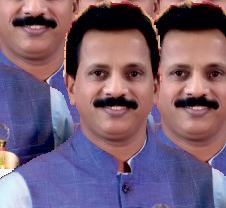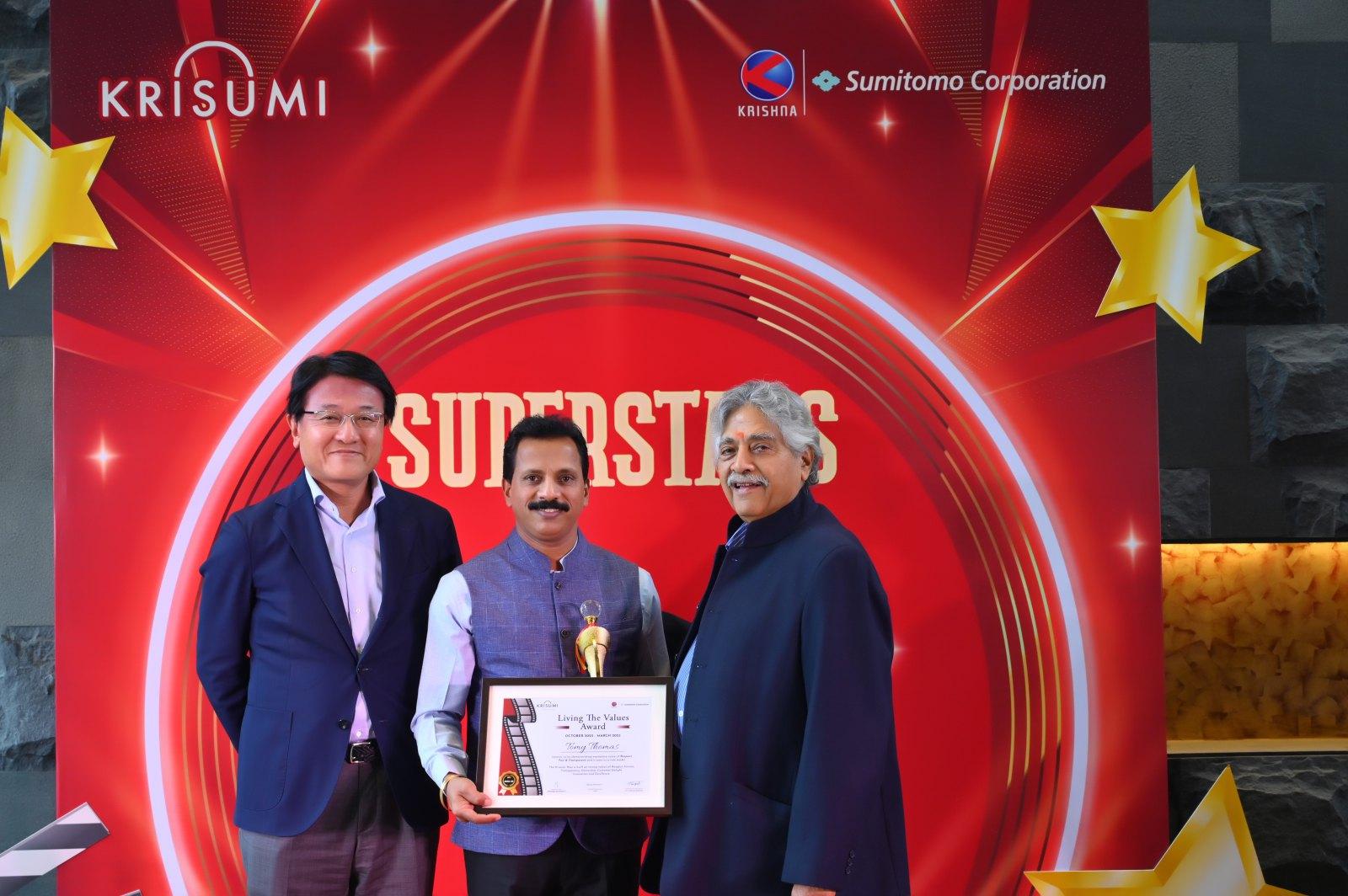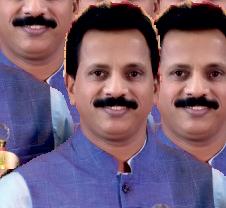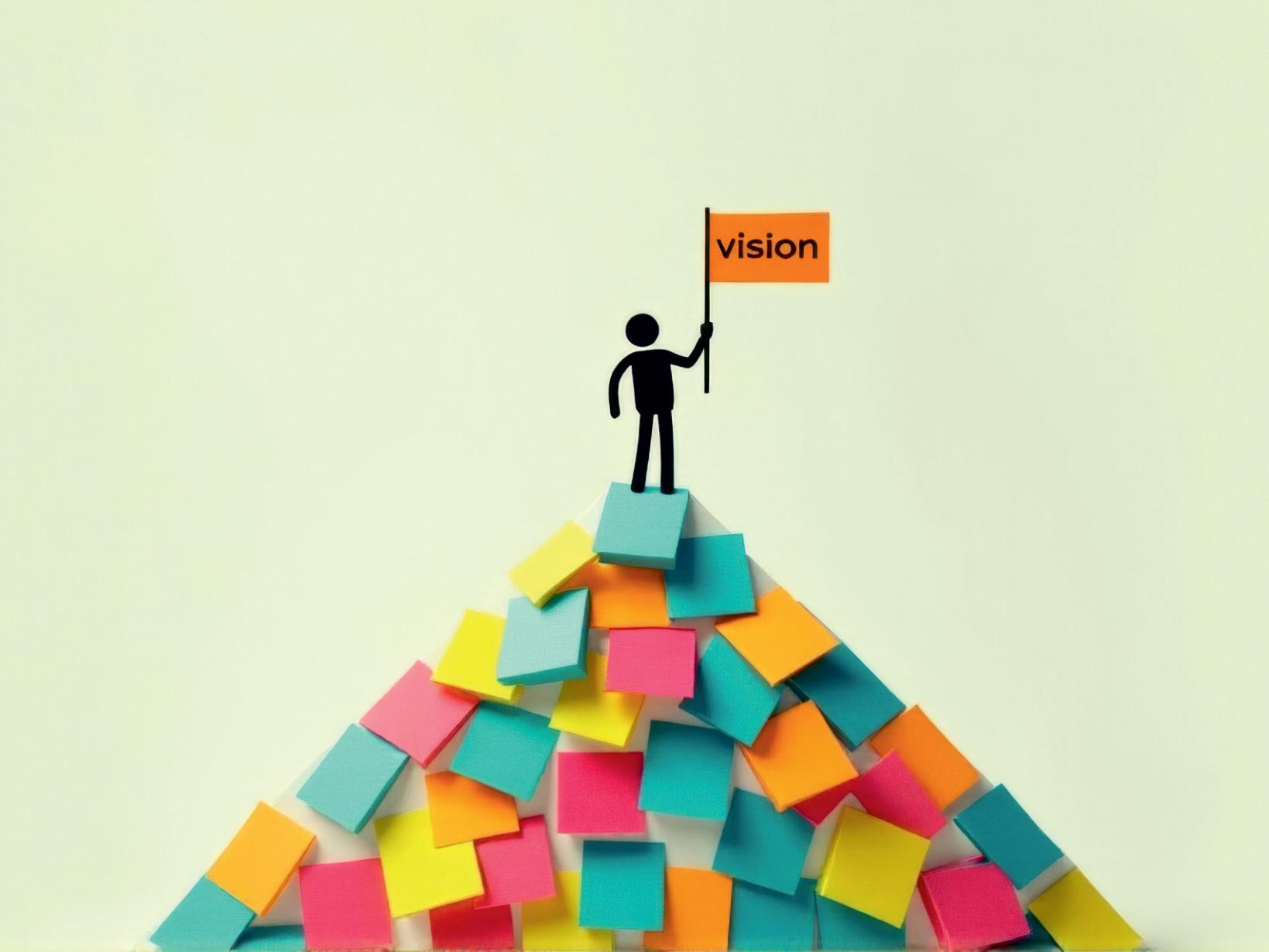












AsweunveilInsightsSuccessspecialeditionof
Most Admired Personality to Look for in 2025,it isbothanhonorandaprivilegetospotlighta leaderwhosejourneyembodiestheveryessenceof inspirationMr.TomyThomas
Inaworldthatisconstantlyevolving,individualslike Tomyremindusofthepowerofvision,authenticity,and service.Whetherthroughtransformativeleadership, groundbreakinginitiatives,orhisunwaveringcommitment topeopleandpurpose,Tomyhascarvedapaththat resonatesacrossindustriesandcommunities.Hisstoryis notjustoneofachievement,butofmeaningfulimpact drivenbyvalues,guidedbyempathy,andanchoredin excellence.
Thiseditionismorethanjustatribute;it’satestamentto what’spossiblewhendeterminationmeetsheart.Aswe lookaheadto2025,webelieveTomyThomasexemplifies thekindofleadershipourworldneedsresilient,inclusive, andforward-thinking.
Throughthiscarefullycuratedfeature,weexplorehis journey,hisphilosophies,andtheinfluencehecontinuesto wieldasacatalystforpositivechange.Hispresenceinthis editionisnotonlytimelybutdeeplydeserving.
Wehopehisstoryignitesasparkwithineachofyou—to leadboldly,livepurposefully,andstriveendlessly
Here’stocelebratingthosewhoinspireustobecomebetter —andtotheremarkablepathaheadforTomyThomas.
Happy Reading!

F E A T U R I N G

The Business Case for Human-Centered HR Leadership in Digital Transformation
Transforming Corporate Culture Through Servant Leadership

Art
Business
Business
Digital
Co-designer
Marketing






















In a time where quarterly goals and financial figures are
frequently used to define corporate leadership, Tomy Thomas is providing a unique and comfortable alternativethatisbasedonsincerityratherthanpower Inhis capacity as President of Human Resources at Krisumi Corporation, he is subtly changing the nature of workplace culture by implementing a leadership style based on compassion,service,anddeliberateaction.Hispathwasnot the result of luck, but rather of a lifetime of prioritizing characteroverqualifications.
Having grown up in a traditional Keralan home and influencedbyyearsofvolunteerworkandreligiousdevotion, Tomy is offering a very human viewpoint to the boardroom. Thedeep,multifacetedfoundationofhispeople-firstattitude is provided by his background, which includes substantial academic efforts in English, human resources, and public administration in addition to religious studies at Don Bosco Seminary.
The ability ofTomy's leadership to balance compassion and vision sets it apart. From founding HR at Grand Hyatt and Emaar MGF to spearheading ground-breaking employee engagementprogramsatKrisumi,heiscontinuouslyshowing how sincere concern for people can result in quantifiable economic benefits. Projects such as the "Employee Charter Program"andthe"KrisumiSchoolofLearning"arenotonly businessbenefits;theyareexpressionsofhisconvictionthat exceptional businesses are created by empowering individuals.
HonorssuchasCHROoftheYear2025andbeingnamedone of India's Top HR Innovators confirm what his colleagues alreadyknow:TomyThomasisnotonlyateamleaderbutis creatingalegacybasedonmutualsuccess,trust,andpurpose.
"Charactermattersmorethancompetence,"Thomasreflects, aphilosophythatwasforgedinhisearliestyears.Growingup in a household where hard work, discipline, and spirituality were not just values but a way of life, young him absorbed lessons that would later become the cornerstone of his leadership philosophy As an altar boy, Mission League leader, and catechism participant at Little Flower Church, Oonnukal, Kerala he learned the art of service a skill that wouldproveinvaluableinhiscorporatecareer
Thomas’s household wasn't just about individual achievement; it was about community upliftment. Watching his parents support daily workers in rural Kerala instilled in him a deep understanding of dignity in labor and the importanceofcaringforthosewhoserve.

“Leadership is not about authority, it's about influence, trust, and the ability to inspire collective excellence.”
These early observations would later manifest in his revolutionary HR initiatives that prioritize employee wellbeingaboveallelse.
HiseducationaljourneytookhimfarfromhometoShillong, Delhi, and Shimla where he pursued degrees in English Literature, Human Resource Management, and Public Administration. But perhaps the most influential experience cameduringhistimeattheDonBoscoSalesianseminaryin Assam,wherethevaluesofempathy,patience,andguidance werenotjusttaughtbutlivedonaregularbasis.
Thomas'sentryintothecorporateworldwasn'taccidental,it was evolutionary. "My journey into Human Resources was not a planned decision; it was an evolution born from my passion for people, service, and community building," he explains.Initiallydrawntopriesthood,hediscoveredthathis naturalinclinationtowardshelpingotherscouldbechanneled effectivelyintothebusinessworld.
His corporate baptism came with the pre-opening team of Grand Hyatt Delhi, where he worked alongside industry stalwartsandabsorbedglobalHRpractices.Thisexposureto world-class hospitality standards became the foundation for his people-centric approach The transition from administrationtohospitalitywasn'tjustacareermove,itwas arevelationthatserviceexcellenceandhumandevelopment couldcoexistprofitablyinthecorporaterealm.



The real test of his philosophy came during his tenure at Emaar MGF, where he spent over a decade crafting HR structurethatpromotedgrowth,engagement,andexcellence inahigh-pacedrealestateenvironment.Here,helearnedthe art of building something from scratch that would prove invaluableinhiscurrentrole.
AtKrisumiCorporation,Thomasfoundtheperfectcanvasto portray his vision of transformative workplace culture. The challenge was unique: integrating Japanese precision with Indian ingenuity while maintaining the human touch that definesgreatorganizations.Theresulthasbeennothingshort ofrevolutionary.
Under his leadership, Krisumi has introduced groundbreaking initiatives that have redefined employee engagement. The 'Homecoming Experience' ensures that every employee feels valued from day one. The 'Employee Charter Program' outlines a commitment to creating a workplace based on fairness and concern for people and thereby creating a problem-free working environment. The 'Krisumi School of Learning' and 'Leadership Development Programs'investincontinuousgrowth.


"Be a servant leader first. True leadership begins when you understand that your primary role is to serve, support, and elevate others around you."

Meanwhile, 'Skip-Level Meetings,' 'Wellness Programs,' and the innovative 'Happiness Board' create an environment where employees are happy, positive, healthy and ensure free flow of communication.
These aren't just HR programs, they're manifestations of Thomas's core belief that when organizationsinvestintheirpeople,businessgrowth becomes a natural outcome. The proof lies in the results: Krisumi has achieved prestigious certifications as a 'Great Place toWork' and 'Dream CompaniestoWorkFor,'validatingtheeffectiveness ofhispeople-firstapproach.
What sets Thomas apart from typical corporate leaders is his unwavering commitment to service beyond the office walls. “As Principal of Sunday School at Nirmal Hriday Church, Delhi, and a twoterm Pastoral Council Member of the Diocese of Faridabad, I continue to nurture young minds and strengthen communities.” he says. His Sunday School's recognition as the 2nd Prize Model Catechism School across the Faridabad-Delhi Diocese speaks to his dedication to holistic education.
His role as Vice Chairman of the Delhi Malayalee Association demonstrates his commitment to community welfare and cultural preservation. Through career mentoring, financial aid, and civic initiatives, he has touched countless lives, proving thattrueleadershipextendsfarbeyondprofessional boundaries.
Physical fitness isn't just a hobby forThomas, it's a philosophy His daily routine includes badminton, volleyball and swimming with family This commitmenttowellnessisn'tmerelypersonal;it'sa leadership tool that teaches resilience, teamwork, andfocuswhileinspiringsimilardedicationamong hiscolleagues.
"Sports also play a vital role in fueling my energy and clarity They're powerful motivators that teach resilience, teamwork, and focus." Thomasexplains. This athletic discipline permeates his professional approach,bringingthesamelevelofdedicationand strategic thinking to boardroom challenges that he appliesonthesportsfield.





“My journey into Human Resources was not a planned decision; it was an evolution born from my passion for people, service, and community building.”
The accolades were numerous and well-deserved. Thomas hasbeenhonoredasHRChampion2024,receivedtheNorth India HR Leadership Excellence Award 2024, and was featuredamongthe10MostAdmirableHRLeadersinIndia 2024.Recently,hewasconferredasoneoftheMostInspiring HR Leaders to Watch in 2025 by Business Prizm Magazine andrecognizedasoneoftheTopHRInnovatorsofIndia2025 bytheWorldHRDCongress.
But perhaps the most telling recognition is his selection as CHRO of the Year 2025, an award that celebrates not just professional achievement but the kind of transformative leadershipthatreshapesindustries.
At the heart of Thomas's success lies a simple yet profound philosophy: servant leadership. "Leadership is not about authority, it's about influence, trust, and the ability to inspire collective excellence." hestates.Thisbelieftransformsevery interaction, every decision, and every initiative into an opportunitytoelevateothers.
His decision-making process is values-driven and collaborative,emphasizinglistening,holisticassessment,and stakeholder consultation This inclusive model not only acceleratesdecision-makingbutensuresalignmentwithlongtermgoalsandorganizationalvalues.

“Lead with purpose, live with integrity, and serve with heart. Success is not measured by titles or wealth, but by the lives you touch, the values you uphold, and the legacy you leave behind.”




Thomasisrefreshinglyhonestabouthisweaknessesandthe lessons they've taught him. Early in his career, he struggled with overcommitment, taking on multiple responsibilities that sometimes led to burnout. "Over the years, I've learned theimportanceofsettingboundaries,delegating,andtrusting otherstolead,"hereflects.
Healsoacknowledgeslearningpatienceindecision-making, movingfrompushingforquickresultstoembracingprocess, consultation, and timing These vulnerabilities, openly shared, make him not just a successful leader but a relatable humanbeingwhocontinuestogrow
For aspiring leaders, Thomas offers wisdom born from experience: "Be a servant leader first. True leadership begins when you understand that your primary role is to serve, support,andelevateothersaroundyou."Heemphasizesthree essential pillars character, clarity, and commitment while stressingtheimportanceoflifelonglearningandresilience.
His message to viewers is both simple and profound: "Lead withpurpose,livewithintegrity,andservewithheart.Success is not measured by titles or wealth, but by the lives you touch, thevaluesyouuphold,andthelegacyyouleavebehind."

As Thomas is looking ahead towards the future, his vision remains clear: creating impact beyond office walls while staying true to his roots Whether through corporate leadership, community service, youth mentoring, or sustainable farming he continues to pursue what he calls "a continuous journey of becoming better for yourself, family, andothers."
FromthefieldsofKeralatotheheightsofcorporatesuccess, TomyThomasrepresentsanewparadigmofleadership,one thatprovesthattruesuccesscomesfromclimbingtheladder andfromliftingothersasyourise.Inanerawherecorporate leadership often feels disconnected from human values, he stands as a beacon, demonstrating that business excellence and social consciousness aren't just compatible; they're inseparable.
Hisstoryisn'tjustaboutprofessionalachievement;it'sabout thepossibilityoftransformingworkplacesintocommunities, colleagues into families, and careers into callings. In Tomy Thomas, we see not just what leadership can be, but what shouldberootedinservice,guidedbyvalues,andcommitted tomakingtheworldalittlebetterthanwefoundit.












In today's fast, fast work world, digital transformation
isn'tanoption,it'sarequirement.Andyet,asbusinesses are hurrying to get new technology on board, they're leavingbehindthesinglekeyingredientforsuccess:people. People-focused HR leadership, the strategy that aligns employee happiness, engagement, and empowerment with tech innovation, is the key to successful digital transformation.
Not only does this kind of strategy improve smooth transition but also develops organizational resilience and performance inthelongrun.
People-centric HR leadership is a forward-thinking strategy where individuals are put at the center of all things, particularly in periods of change. It is grounded in active listening,empathy,mutualinclusivity,andbuildingaculture where employees feel heard. Unlike conventional HR practicethatis,insomeinstances,compliance-andprocessoriented, this strategy enables co-creation, emotional intelligence,andgrowthmindset.
While digital transformation remakes job functions, processes, and business models, employees are most likely overwhelmed by uncertainty. Human-first leaders know that iswhereitallfallsapartandgivesthecare,communications, andreskillingtoenableemployeestolearnandadapt.
Why the Human Element Matters in Digital Transformation?
Technology can transform operations but will be future focused only when staff are engaged and prepared. Peoplefocused HR leadership positions ensure technological changes in digital technologies are implemented with empathy and commitment to human requirement For example, technological innovation in automation technologies can automate business processes but, when employeesarethreatenedofbecomingobsoleteordonothave relevantskills,resistancehobblestransformationprocesses.
Study after study tells us that highly engaged organizations outperformothersonproductivity,customersatisfaction,and innovation. Empathetic decisions by HR leaders, like on employeehealthspendingormobilizingteamsfordigital
road mapping conversation, build resilience and trust. Trust liesatthecenterofenduringchangeandinnovation.
Digital transformation is not an event but a process Organizations require an adaptable, learning, and agile workforce. These can be nurtured by people-centric HR leadershipthatempowersthemtofostersuchculture.Rather thandoingtop-downchange,ittriestoestablishcollaboration andfeedbackloopsthatenableworkerstobecomethedrivers ofthechange.
Leadership starts with substituting the words "change management"with"changeenablement."Itisasemanticbut significant distinction: It is enabling individuals with both capability and attitude to change, as opposed to managing how they respond. It is creating learning systems that are shaped to cater to individual requirements, acknowledging different learning methods, and providing an empathetic psychicspacewhereonemightexplore.
The arrival of AI, machine learning, and analytics has provided HR functions with powerful tools to streamline recruitment, performance management, and employee engagement. But human HR leadership makes sure these tools are used ethically and in an transparent way For instance,whenusingalgorithmsforrecruitment,onehastobe careful not to introduce bias and also verify if humans are involvedtobefair.
In addition, worker input, mental health, and computer collaborationtoolsworkbestwhenemployeesseethemasa standardpartofpeople-firstleadershipculture,ratherthanas spyingorproductivity-gaintools.People-firstleadersclarify in simple terms that motivation for technology use is being createdandinviteworkerstobeco-creatorsoftoolchoiceand deployment.
Pastmeasurementslikecostsavingsorprocessefficiencycan show short-term success, but never the success of digital transformation.People-firstHRleadershipwouldmeanmore interconnected measurements—like employee experience ratings, psychological safety ratings, inclusion ratings, and learningagility.Thesewillcaptureaclearersenseofhowwell abusinessisgoverningtransformationonapeople-firstbasis.
By placing these behaviors on the leadership dashboard, the sentiment of employees is not only recognized but actually tapped to inform strategic decision-making. Over time, this produces a concrete staff that is more engaged, reduced turnover,andincreasedcapacitytoinnovateandrenew
Some of the most progressive companies have embraced human-centered HR leadership to lead their digital transformation Consider, for example, Satya Nadella's remakingofMicrosoft.Theapplicationofthegrowthmindset philosophy, empowering employees, and culture change, Microsoft reshaped itself as a pacesetter in tech innovation andaglobal-classemployerleadershipplatform.
Unilever is a good example where human values are interwovenintoitsFutureofWorkagenda.Withone-on-one career guidance and digital upskilling methods, Unilever neverlagsbehinditsemployeesinthedigitalage.
Forcompaniesalreadydownthedigital-transformationroad, adopting a human-capital vision for HR leadership is not an optional nice thing—it's a strategy call. The further we go downtheroadofAIandautomation,thecompaniesthatwill thrivearethosethatseehumansasassetstobedeveloped,not problemstobemanaged.
HR executives and leaders should change the outdated hierarchies,investintrainingemotionalintelligence,anduse instant feedback systems and tuning.Above all, they should lead with honesty, curiosity, and a passion for making work morehuman,eveninthisdigitizedera.
It is people power that powers digital transformation, although technology may light it. Human-focussed HR leadershipmarriesinnovationandexcecutionbydeveloping changeagentsratherthanchangevictimsamongemployees. Asbusinessescannotcontinuebeingpackleadersandrobust during times of adversity, embracing this type of leadership will be essential to achieving long-term success. For when individuals thrive, businesses do as well. And in today's environmentofchange,thathumanfactormightbeyourbest competitiveadvantage.

In today's world of breakneck speed, technology
upheaval, and changing workforce expectations, companies are being asked to reimagine not only their business models, but the very cultures that shape their businesses. At the center of this culture revolution is a compelling,people-focusedphilosophy:servantleadership.
Unlikeotherleadershipmodels,whicharebasedoncontrol, hierarchy,andauthority,servantleadershipturnstheseideas on their head. Servant leadership is based on the function of servingotherpeople—primarilyemployees—first.Itcreates anenvironmentinwhichteamwork,empathy,andtrustthrive, eventuallyrevolutionizingthecorporateculturefromwithin.
TheEssenceofServantLeadership
Inessence,servantleadershipisaboutputtingstaff,customer, and broader social interest before individual ambition or corporategain.ItwasfirstdefinedbyRobertK.Greenleafin the1970s,whothoughtthatgreatleadersareactuallyservant leadersfirst.
In reality, it is leaders who listen empathetically, empower others,makedecisionstogether,anddevelopindividualsand organizationinothers.
In the modern-day business culture where burnout and disengagementarenowthenormamongemployees,servant leadershipisastrongalternative.Itisareframingofthefocus away from short-term gains to long-term value, away from competition to cooperation, and away from control to empowerment.
Oneofthemostrevolutionarythingsaboutservantleadership is that it offers a means of building trust within an organization. If leaders care about their employees and take care of their welfare, there develops a culture of mutual respect. Employees start to feel valued, heard, and respected—not as employees, but as humans with their own talentsandambitions.

This trusting culture is a fertile ground for innovation. Employeeswhoaretrustedandprovidedwithpsychological safetytoexperimentarelikelytoprovideinnovativesolutions and rock the boat. Organizations that work with servant leadership discover that decisions turn out to be cooperative and effective with a sense of shared purpose and not fear of failure.
The value of servant leadership is more than employee and team morale; it has tangible effects on organizational performance. Organizations with servant leaders have been found to experience greater employee retention, higher customer satisfaction, and higher overall productivity based onvariousstudies.
Whenindividualsaredrivenbypurposeratherthanmerelyby numbers,theyworktheextramile.Servantleaderemployees show higher engagement, identification with their jobs, and affinity with their colleagues That unity leads to more resilientandcloserteamsandamoreresponsiveorganization.
Asidefromthat,servantleadershippromotesthereputationof thebrand.Clientsandstakeholdersaremoreattractedtosuch organizations that are values- and people-centered. Both internallyandexternally,servantleadershipfostersasenseof responsibilityandauthenticity—twothingsdemandedinthe modernsociallyresponsiblebusinessenvironment.
Despitethewonderfulbenefitsofservantleadership,itisnot easytointroduceandmustbeaccompaniedbydedicationand self-reflection.Businessculturestoalargeextentstilloperate on competitive attitudes that embrace individual success at the cost of group success. Changing this attitude takes time and even calls for retraining leaders at all levels within the organization.
Additionally, servant leadership is a vulnerable act a personality trait not commonly considered in the realm of businessleadership.Leadersneedtobeabletoacknowledge errors, solicit feedback, and set aside ego. This emotional intelligence may be hard-won, especially in the most fastpaced industries where speed and assertiveness are paramount.
To actually bring this change about, firms can begin with incorporatingthevaluesofservantleadershipintoleadership development programs, performance management, and
internal communication strategies. The power of leading by examplecanbeleveraged;iftopleadershipdoesthat,itsends averystrongmessagethatthecultureischanging.
Think of organizations such as Southwest Airlines, The Container Store, or Marriott International—organizations that are always cited as possessing great cultures and customer-focused value systems. Central to their achievementisaservantleadershipphilosophy Theirleaders place their employees' development first, promote from within, and continuously encourage employee participation indecision-making.
Thesearejustacoupleofthenumerousexamplesinlifethat show servant leadership is not merely a philosophy—it's a practicethat,ifdonesincerelyandregularly,canhavelasting effects.
Shaping corporate culture with servant leadership isn't learning a new set of don'ts and do's—it's an invitation to redefinewhatleadershipisallabout.It'saninvitationtocreate organizations where empathy, not vulnerability, creates strength,andwhereleadersrealizetheirfirstresponsibilityis notastaskmasters,butascaretakersofpeople.
The world is evolving, and the future generation of talent expects more than a salary. They're looking for purpose, belonging, and values alignment. By embracing servant leadership,companiesarenotonlysettingthemselvesupfor long-term success but are also helping to make the world a more human and fair business environment. Let's find out more.
Finally, the deepest change occurs not through mandates or management orthodoxy, but through leaders who will serve. Thatisthepromise—andpotential—ofservantleadership.




For Subscrip�on: www.insightssuccessmagazine.com
www.x.com/insightssuccess

